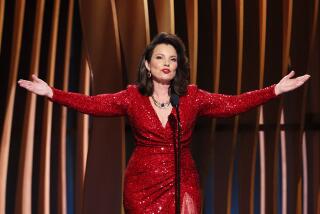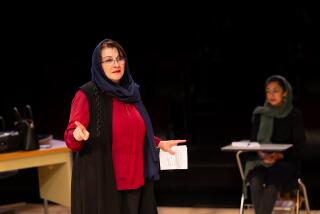MacArthur Fellowship goes to director Annie Dorsen for ‘algorithmic theater’
Director Annie Dorsen, who creates performance pieces that she calls “algorithmic theater,” has been named a recipient of a 2019 MacArthur Fellowship.
“This might be the one time in life that you get to have an uninterrupted good mood for six months,” Dorsen joked in a phone interview about the award, which comes with a $625,000, no-strings-attached stipend from the John D. and Catherine T. MacArthur Foundation, to be paid in quarterly installments over five years.
The foundation said grants go to individuals who demonstrate “exceptional creativity” through a “track record of significant achievement and manifest promise for important future advances.” But what, exactly, is algorithmic theater?
Dorsen has an answer, or many answers, depending on how you break down her thoughts on the intersection of computer technology and theater. Her first foray, the 2010 project “Hello Hi There,” featured two computers onstage recontexualizing a 1971 television debate between the philosopher Michel Foucault and the linguist Noam Chomsky. Each night the custom-made chatbots, with the aid of computer programs, performed a different live text as if it were a new conversation.
In 2013 Dorsen went to the next level with “A Piece of Work,” in which she took on “Hamlet.” The formidable play was broken down and rebuilt using computer technology. Sometimes the play was compressed, other times individual lines found themselves in wild new contexts. Only the third act was performed by a human, who spoke lines created by the machines.
Her most recent project, “Infinite Sun” (2019), features 11 laptops that “sing” continuously from morning until night using an algorithm that generates songs using mantras from various spiritual traditions.
Asked about her upcoming work, Dorsen admitted to being overwhelmed by the MacArthur Fellowship and said she will need time to sort through options. She has two projects in the works but said it’s too early to discuss them.
She called the MacArthur honor a vote of confidence, encouragement and validation. But more than that, she said, “It’s a prompt and exhortation to be ambitious and unafraid — to think differently about the contexts in which you might work or fantasies you may have had that you haven’t allowed yourself to think about.”
One thing of which Dorsen, a graduate of the Yale School of Drama, is certain: The award will give her the time, space and bandwidth to write a book on algorithmic theater.
Previously, Dorsen was best known for directing “Passing Strange,” the 2008 musical created by singer-songwriter Mark Stewart (known as Stew) and Heidi Rodewald in collaboration with Dorsen. That show landed at the Belasco Theatre on Broadway and was nominated for seven Tony Awards, including best musical. It won best book of a musical.
Times theater critic Charles McNulty dubbed the musical “an indie-rock coming-of-age travelogue” and called it one of the best musical nominees that season.
Despite this success, Dorsen found herself at a crossroads the following year. She wasn’t sure how much longer she would work in theater, and she started the research that would inform her move to algorithmic theater.
“I kept a lot of the apparatus of theater. There’s a beginning, a middle and an end. You sit in your seat and have a ticket, and the lights go up and down,” she said.
It’s business as usual, but without the playwright and the actors.
“That helped me see theater in a different way,” Dorsen said. “By stripping away almost everything, you can actually start to bring it back in new ways.”
It’s not that Dorsen dislikes actors and playwrights and loves machines, she said. To the contrary, she is interested in all of the above — particularly what the various parties have in common.
His grass orbs burst through the sidewalk at the Broad museum. Meet the MacArthur Fellow bringing the past into the landscape of the present.
Her inspiration came while reading a 1950 essay by the English mathematician and computer scientist Alan Turing. “Computing Machinery and Intelligence” explored the idea of artificial intelligence, with Turing arguing that because humans don’t actually know what thinking is, humans cannot produce actual thinking in a machine. He went on to say that humans could, however, produce the effect.
“When I read this I thought, ‘Aha, in a way theater is about producing an effect or an illusion,’” Dorsen said. “The relationship between computer science, machine learning and theater is a strong one, and a fertile ground for exploration. Both have to do with the uncertainty between truth and illusion — what you can trust, how you know what you know, and do your eyes deceive you.”
She said that 10 years ago she was thinking about significant changes in the nature of knowledge, how people discerned fact from fiction and how they justified belief from opinion. Today she sees a crisis that can be witnessed in politics, the economy and social relationships.
“That crisis is something that theater is very familiar with,” Dorsen said. “It’s the essence of the form. The actors are really doing something, but at the same time it’s an illusion, a fiction. It’s happening in a metaphoric space, and that double nature of theater seems very similar to computer-generated language.”
2019 MacArthur Fellows
Elizabeth Anderson, philosopher
Sujatha Baliga, lawyer and restorative justice practitioner
Lynda Barry, graphic novelist, cartoonist and educator
Mel Chin, artist
Danielle Citron, legal scholar
Lisa Daugaard, criminal justice reformer
Annie Dorsen, theater artist
Andrea Dutton, geochemist and paleoclimatologist
Jeffrey Gibson, visual artist
Mary Halvorson, guitarist and composer
Saidiya Hartman, literary scholar and cultural historian
Walter Hood, landscape and public artist
Stacy Jupiter, marine scientist
Zachary Lippman, plant biologist
Valeria Luiselli, writer
Kelly Lytle Hernández, historian
Sarah Michelson, choreographer
Jeffrey Alan Miller, literary scholar
Jerry X. Mitrovica, theoretical geophysicist
Emmanuel Pratt, urban designer
Cameron Rowland, artist
Vanessa Ruta, neuroscientist
Joshua Tenenbaum, cognitive scientist
Jenny Tung, evolutionary anthropologist and geneticist
Ocean Vuong, poet and fiction writer
Emily Wilson, classicist and translator
More to Read
The biggest entertainment stories
Get our big stories about Hollywood, film, television, music, arts, culture and more right in your inbox as soon as they publish.
You may occasionally receive promotional content from the Los Angeles Times.







